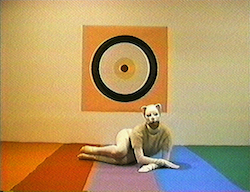|
EAI's "Edited at EAI" series continues with a focus on a group of conceptually driven performance videos by women artists who reenergized and redefined the genre in the 1990s, as seen through the lens of EAI's editing facility. These lo-fi performances staged for the camera—by artists such as Vanessa Beecroft, Alix Lambert, Kirsten Mosher, Alix Pearlstein, and Beverly Semmes, among others—evoke the strategies of the first generation of artists working with video in the early 1970s, even as their bold stylizations, ironic sensibility, and explicit nods to consumer culture announced a fresh approach to representations of female identity and the body that spoke emphatically to its time.
Organized in conjunction with EAI's 45th anniversary, the "Edited at EAI" series highlights a historically significant but less well-known area of EAI's programs: EAI's Editing Facility for artists, one of the first such creative workspaces for video in the United States. .
|
|
The mid-1990s saw a new wave of female artists who took up video and performance to explore themes of social and sexual identity. Artists such as Cheryl Donegan, Vanessa Beecroft, and Alex Bag, among many others, staged striking performances for the camera that employed intimate but dynamic visual tableaux that recalled (and often subverted) the tropes of MTV, fashion magazines, and advertising, presciently blurring pop culture and artworld discourses. Recorded on then-current video formats such as Hi-8, Video 8, SVHS, and Mini DV, these works signaled a return to video as a studio practice, with the artist often recording herself in front of the camera and using her body as subject or art-making tool. Deploying provocative and often humorous gestures that re-imagined female identity and sexuality through the filters of popular culture, such works put a new spin on the iconic notion of video as a mirror.
A number of these works were featured in the 1997 exhibition Young and Restless, which was curated in 1997 by Stephen Vitiello (who was then EAI's Distribution Director) and co-organized with Barbara London and Sally Berger for The Museum of Modern Art. New York, and distributed by EAI. The Restless Generation program revisits and reflects on works from this period through the perspective of EAI's editing facility in the 1990s.
Works such as Beecroft's Piano Americano (1996) and Alix Pearlstein's Interiors (1996) frankly address the artists' relationships to consumerism, sexuality, and the camera's gaze. While primarily identified with a young, postfeminist generation, these inquiries take distinctive form in the video performances of Ursula Hodel, a Swiss art collector turned artist who unabashedly examines narcissism, desire, high fashion and glamour, with humorous hauteur.
Kirsten Mosher's Carmen 1 (1995) and Alix Lambert's Male Pattern Baldness (1994) extend the provocations of gender tropes, with each artist represented by a masculine surrogate (a battery-operated toy soldier, in Mosher's case, and the artist dressed as a balding middle-aged man, in Lambert's). In Beverly Semmes's In and Around the Garden (1993), two short pieces shot on Super-8 film, the artist is seen in a formal garden and in bucolic woods, dressed in elaborate attire of her own creation, conjuring a surreal narrative landscape in which the costumed woman is foregrounded.
Often exhibited in what was then a new presentation mode of looped video on monitors, these uninhibited and irreverent performance works emerged in parallel to a resurgence of single-channel video within the context of the artworld. Although identity politics, the fusion of art and fashion, and the rise of reality television are among the 90s-era themes that can be charted throughout this program, these powerfully self-aware works have only gained in relevance in the intervening twenty years.
___________________________________
Across five decades, an extraordinary group of artists has used EAI's facility to create some of the most significant works in media art's diverse alternative histories. Many more of these artists and works will be featured in subsequent screenings throughout our 45th anniversary year.
___________________________________
About EAI
Celebrating our 45th anniversary in 2016, Electronic Arts Intermix (EAI) is a nonprofit arts organization that fosters the creation, exhibition, distribution, and preservation of moving image art. A New York-based international resource for media art and artists, EAI holds a major collection of over 3,500 new and historical media artworks, from groundbreaking early video by pioneering figures of the 1960s to new digital projects by today's emerging artists. EAI works closely with artists, museums, schools and other venues worldwide to preserve and provide access to this significant archive. EAI services also include viewing access, educational initiatives, extensive online resources, technical facilities, and public programs such as artists' talks, screenings, and multi-media performances. EAI's Online Catalogue is a comprehensive resource on the artists and works in the EAI collection, and features expansive materials on media art's histories and current practices: www.eai.org
___________________________________
Electronic Arts Intermix
535 West 22nd Street, 5th Floor
New York, NY 10011
t (212) 337-0680
f (212) 337-0679
info@eai.org
EAI on Facebook
EAI on Twitter
___________________________________

EAI's Public Programs are supported in part by the New York State Council on the Arts, with the support of Governor Andrew Cuomo and the New York State Legislature, and the New York City Department of Cultural Affairs, in partnership with the City Council. EAI also receives program support from the Andy Warhol Foundation for the Visual Arts.
|

